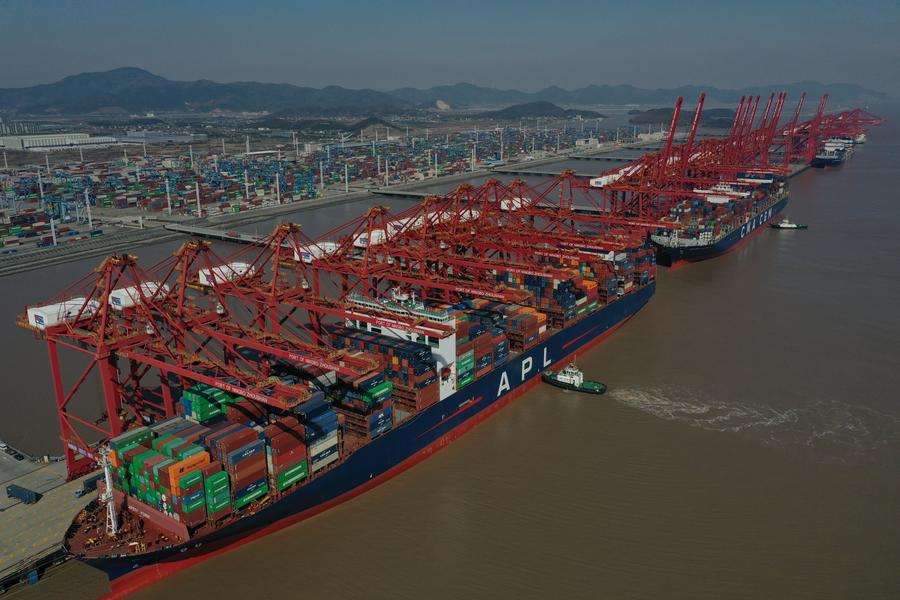An aerial drone photo taken on Jan. 24, 2024 shows a cargo ship docking at the Meishan port area of the Ningbo-Zhoushan Port
Chinese companies are generally upbeat about the prospects of selling their products to overseas markets and such optimism is supported by favorable conditions both at home and abroad.
A recent survey conducted by the China Council for the Promotion of International Trade (CCPIT) shows that 81.6 percent of foreign trade-oriented firms predict stable or increased exports in the first half of the year.
China's exports grew 0.6 percent in 2023, slowing down from a 10.5-percent jump in 2022. As one of the main pillars for sustaining an economy, the possibility of dynamic exports in 2024 comes as good news for China, which is taking action to secure a GDP growth of around 5 percent this year.
Global demand pickup
The confidence of foreign traders is growing on the back of expedited exports owing to recovering external demand, CCPIT spokesperson Zhao Ping said.
In April, the World Trade Organization forecast a rebound in global trade, expecting merchandise trade to expand 2.6 percent in 2024 and 3.3 percent in 2025 after dipping 1.2 percent in 2023.
Behind the pickup is a global inclination for consumption. Households in advanced economies supported their spending by drawing down accumulated pandemic-era savings, and larger-than-expected government spending further supported the expansion of aggregate demand in most regions, the International Monetary Fund found in its World Economic Outlook issued in April.
With global trade recovering gradually since the fourth quarter of 2023, key foreign traders in China were reporting a continuous improvement in new orders, the Ministry of Commerce (MOC) said last month.
Against the backdrop of risks and challenges arising from unilateralism and protectionism pursued by some countries, the Chinese government would move to address the difficulties faced by foreign traders and help them hone their international competitiveness, MOC spokesperson He Yadong said.
Magnetic China products
Stars of the English Premier League giant Tottenham Hotspur F.C. will be literally supported by Chinese products in the near future. Chinese artificial grass manufacturer Citygreen Turf has recently signed a deal with the club to cover its training fields with man-made turf.
"The technical features, including structure, friction and elasticity, of artificial grass manufactured by many Chinese companies are almost the same as those of natural grass," Citygreen Turf's deputy head Xu Jing told Xinhua.
Artificial turf epitomizes a new host of Chinese products that are gaining popularity on the global market owing to their fancy designs and high quality, combined with reasonable prices.
At the top of such sought-after goods are electric vehicles (EVs), lithium-ion batteries and photovoltaic products. The China-Europe freight train service has witnessed rising overseas demand for the three major tech-intensive green products, dubbed the "new three."
"The number of China-Europe freight trains loaded with EVs has risen to 5-8 every month this year from 1-2 in the past," said Cao Ping, who is in charge of vehicle transportation of the China Railway Special Cargo Logistics' local branch in Xi'an, Shaanxi Province.
China's exports are underpinned by the global appetite for its products of both traditional and newfound competitive edges, according to Zhao.
Trade facilitation
Initiated by the World Customs Organization, Authorized Economic Operator (AEO) status grants a company preferential management measures, such as priority processing, reduced frequency of supervision and optimized services, in order to facilitate customs clearance.
Holding AEO status has allowed KEIPER (Changshu) Seating Mechanisms, an automotive component supplier in China, to increase its exports to South Africa by 88 percent from January to April, partly due to the high customs clearance efficiency.
Official data shows that as of the end of April there were 5,882 AEO-holding enterprises across China, which handled 36.3 percent of the country's total volume of foreign trade.
Chinese authorities are now working towards more AEO customs agreements with major trading partners to streamline trade procedures.
As a vital force for boosting foreign trade, China's cross-border e-commerce trade has grown more than tenfold over the past five years. To take cross-border e-commerce a step further, Chinese enterprises are pinning high hopes on overseas warehouses.
Shenzhen Baosen Suntop Logistics Co., Ltd. has built three overseas warehouses in the Netherlands, Germany and Britain since 2020. "Delivery from overseas warehouses features lower costs and a better client experience," said sales director Mayel Ye.
The MOC is pushing for the release of guidelines on expanding cross-border e-commerce exports and advancing the construction of overseas warehouses.





